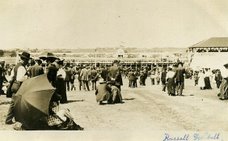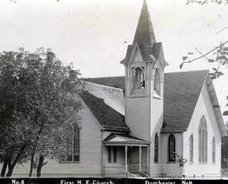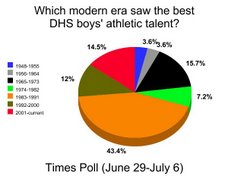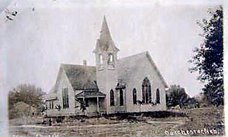 Dorchester has a lot going on right now, but there's still a large number of Dorchester residents who want village leaders to act on a plan to pave Dorchester's streets -- even if it's only a limited paving strategy.
Dorchester has a lot going on right now, but there's still a large number of Dorchester residents who want village leaders to act on a plan to pave Dorchester's streets -- even if it's only a limited paving strategy.Critics of such a plan will resort to their traditional response: How do you propose we pay for such an undertaking? After all, Dorchester is trying to pay for water improvements, drainage projects and other endeavors.
But we still believe that with newly paved streets (in certain areas -- not every street) will come new home construction, more home improvements, increased property value, less damage to vehicles, better air quality, less money spent on gravel and labor, a renewal of community pride, and a better quality of life in general.
So we decided to explore the methods of revenue collection used by other communities currently paying for new paving projects. We found a variety of approaches.
- IMPACT FEES ON BLIGHTED PROPERTIES: The City of Lincoln, for example, relies heavily upon "impact fees" that are applied to new homes built in the city's outer limits. One member of the Times staff suggested "impact fees" on condemned properties (commercial and residential), abandoned homes, blighted buildings, and properties whose owners won't obey the village's clean-up orders. Not a bad idea, we think.
- NEW FEES ON SEWER/WATER HOOK-UPS: Smaller communities with populations more similar to Dorchester also impose impact fees. Ceresco has a water and sewer development fee of $2,250 per lot. Malcolm has a tap fee for sewer and water of $250 per lot, plus a sewer and water fee of $2,250 per lot. These fees are used, at least in part, for road improvements.
- BONDING: Since Dorchester doesn't have a boom in new home building -- not yet, anyway -- the village would likely need to utilize a bonding program. Many communities that take on new paving projects have residents vote on a bond issue, typically paid for by an increase in property tax -- which is never too popular.
- LOCAL OPTION SALES TAX: Dorchester could impose up to a 2-cent sales tax on goods sold in the confines of the village, with the revenue being dedicated to paving. Such a tax would need to get voter approval first under the state's LB840 program.
- GET CREATIVE: There are some more creative and affordable ways of accomplishing the paving mission. Some communities hold special fundraising drives to offset the overall cost. One community even found "sponsors" who donated substantial sums and renamed streets after the largest donors. In Washington state, one small community recently paved all of its streets thanks to a donated labor and machinery from a heavy equipment operation school.


















































Here we go again. The bloggers starting problems
ReplyDeleteI tend to prefer people who offer ideas over those who imitate stumps in the road.
ReplyDeleteBut that's just me.
Stumps in the road, hell no.
ReplyDeleteMore like bomb craters.
I thought the "new blood" on the board was supposed to take care of that?
Same holes, same places.
Some things will never change
Pave just one or two blocks and I promise you'll see a new spirit blossom in this town. Promise!!
ReplyDeleteThis may not be legal..or it may have to be placed on the ballot, but Dorchester is probably one of the most reasonable towns around to have a drink..this may be a burden to the Rough Reins,Joes & Legion but if they agreed to charge a "delivery fee" (taking it from the bar or cooler to your table) LOL of let's say 25 cents per delivery... and we place the "delivery fee" into a separate fund for street improvements. It's a win win situation. #1 You support the local business #2 You support the community street problem and the more you support #1 and #2 the happier YOU are.
ReplyDeleteI'm a dorchester resident who wants to see a newly paved subsection of town, like the one the city of wilber and doug oliva worked on in southwest wilber. It might mean only 2 or 3 new homes a year, but that would be 2 or 3 more new home homes that have been built in in town over the past 10 years. If you don't want to plan for the future, why not just get a razor blade and an anatomy chart showing the major arteries?
ReplyDeleteGET CREATIVE: Suggest going to Warren Buffett's house in Omaha and looking under his sofa cushions for loose change.
ReplyDeleteProlly paving money plus a swimming pool....